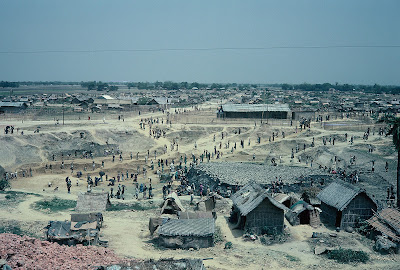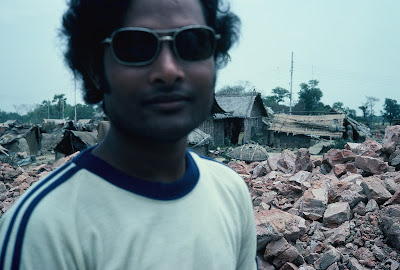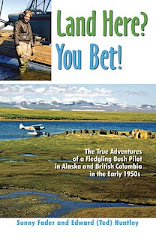Bangladesh – The Untold Stories
(For the full story read The Gainesville Years, 1 through 10)
We were in Bangladesh to do a documentary for the Presbyterian Church U.S. The purpose of the documentary was to help raise funds for an ecumenical project being spearheaded by the only Presbyterian missionary in the country. The story was inspiring: Thousands of Bengali refugees, victims of the country’s bloody war for independence and the disastrous typhoons that followed, had been dumped in a barren rice field miles from Dhaka without shelter, food or sanitation. Touched by their plight, this Christian coalition of clergy set into action a program that was transforming the desolate rice field into a viable, self-supporting community complete with housing, and even a stocked lake so the people could feed themselves.
 |
| From desolate rice field to viable community. |
But as important and as powerful as this story was, today when I think of the time I spent in Bangladesh what I remember most are the untold stories from that trip, the stories that never made it into the documentary, but changed the way I see the world. Like the personal story of Aasim, the soft-spoken, dedicated Bengali man who oversaw the construction of the houses for the new community. For his safety, I am not using his real name, but this is his story.
 |
| Aasim at work. |
I met Aasim while I was gathering research for the script. Though it didn’t seem to slow him down, I noticed that he didn’t have full use of his right arm, and asked Dr. Coddington about it. “His father tried to kill him,” Dr. Coddington said, “because he became a Christian.”
Aasim was reared as a devout Muslim, but he was a curious young man. In the course of studying the Koran he came across a prophet named Jesus Christ, not as important as Mohamed, but still a major prophet for Muslims. However, whenever Aasim would ask about this Jesus Christ his father would become angry and refuse to discuss the prophet with him. Aasim’s father’s reaction only intensified the boy’s curiosity. So when one day Aasim met a Christian missionary he put his questions to the man, who was happy to satisfy that curiosity. The missionary even offered to help Aasim learn all about the Prophet’s teachings.
Aasim took the missionary up on his offer. In Aasim’s mind, Dr. Coddington said, he was not doing anything wrong. After all, this Jesus was revered by Muslims. However, what Aasim learned under the tutelage of the missionary resonated with the young man so strongly that in time he decided to become a follower of this prophet...to become a Christian.
Aasim’s father was furious. He decided to kill his infidel son. He planned to do this during a Muslim holy day celebration. Fortunately for Aasim, an aunt who cared about him overheard his father discussing his plan and warned the young man. Although Aasim did not want to believe her, he stayed alert during the festivities. When his father suddenly lunged at him with a dagger, Aasim was able to thwart a fatal blow, but the blade cut through his raised arm, doing irrevocable damage to critical muscles. Miraculously (according to Aasim) he managed to escape with his life.
When I spoke with Aasim about the experience he told me he is sad that he will never be able to return home. He sorely misses his mother and aunt. But as I watched the unbounded enthusiasm with which he went about his work, and the way his face lit up when he spoke to me of his “Savior” and the miraculous changes in his life since he has found Christ, it was clear to me that Aasim's newly found faith feeds the man's soul.
I heard a debate the other day on NPR. The statement posed: “The world would be better off without religion.” Arguing in favor of the statement were A.C. Grayling, a British philosopher and professor, and Matthew Chapman, a journalist and screenwriter and the great, great grandson of Charles Darwin. Arguing against the statement were Rabbi David Wolpe of Temple Sinai in Los Angeles and Dinesh D'Souza, President of Kings College, London. To hear the debate click the link below.
The debate made me think: Over the years I have had the privilege of working for some remarkable Christian organizations and documenting the accomplishments of numerous exceptional men and women whose work was inspired by their faith. Yet, in spite of this evidence I wonder if perhaps the world might not be better off without religion. I respect those who find solace and inspiration in their faith, who believe adhering to their religion makes them better people. But while I have an unshakable belief in a Divine force I choose to call God, it seems to me that religion has done far more harm than good in this world.
Aasim’s alienation from his family because of his conversion is just one example. There are more examples from Bangladesh I will share with you in future postings. But I need look no further than my own family for examples. It was religion that caused my father’s family to be banished from Spain...to wander for generations through South and Central America before my great grandmother and grandfather finally settled in Philadelphia. It was religion that triggered the pogroms that forced my mother’s family to leave Tsarist Russia. Religion was the trigger for the bloodbaths in Africa, Ireland, and the Slavic countries, and continues to make the Middle East a bloody, irrational battle ground.
For all the comfort I have seen people derive from their faith, in spite of the reassuring sense of identity I know it gives many people, and all the good work has been done in the name of religion, even at its best religion still separates people into “them and us.” And as long as this is a "them and us" world, compassion will be unsustainable... and lasting peace forever unattainable.
Next: the rice planters and fish gatherers of Bangladesh.







No comments:
Post a Comment